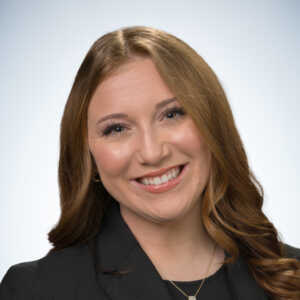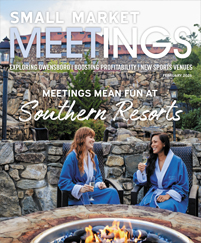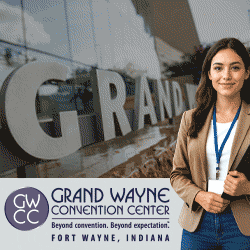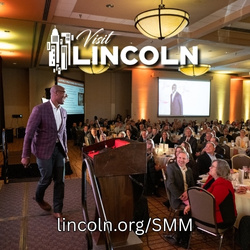Rachel Crick recently spoke with Allie Selznick, the meetings coordinator for the American Association of Airport Executives on why mentorships continue to be important with the next generation of planners.
Allie Selznick attended James Madison University (JMU) and graduated in 2023 with a bachelor’s degree in hospitality management. She briefly worked with the JMU Alumni Association before becoming a meetings coordinator at the American Association of Airport Executives (AAAE), a role she has held for over two years. In addition to her career as a meeting planner, she is president of the Robert Anthony Eriksson Foundation, an organization for mental health. She also coaches high school volleyball and mentors JMU hospitality management students. She earned her CMP earlier this year and was featured as one of BizBash’s Fresh Faces of 2025.
Q: Can you tell me about your experience with your own mentor?
A: In college, most of my mentors were my professors, as well as some of my friends who were older than me and going into the industry. One of my closest friends helped shape who I am. She made me realize I could mentor people who were younger than me. One professor sent me the job posting for my current role. I also got a mentor through PCMA who has really helped with so many situations that I didn’t know how to handle professionally and personally. She helped me navigate a lot of hard situations, figure out how to express myself better and learn to advocate for myself. She also really supported me throughout getting my CMP, which was a huge accomplishment and one I don’t think I would have gone for just yet had it not been for her support.
Q: What do the next generation of planners provide as mentors?
A: I think there’s a lot of fresh perspective. I have a lot of experience advocating for myself now. For example, usually I would think someone who’s getting their CMP is midway through their career, but I found out that I had the qualifications, and I got a scholarship to be able to do it. I have that unique point of view where I can encourage people to get their certification at any point. As soon as you have those three years of full-time experience and that industry degree, go get it — it will be worth it.
Also, I can speak on advocating for yourself, working on getting raises or promotions, and negotiations. A lot of students don’t really think about joining professional organizations after college, let alone being involved in one in college. It’s nice for the younger generation to be able to share those experiences of being part of that and growing their network. When you’re first coming out of college, it can be very intimidating to go to these events and not know a single person. Having someone who’s younger you can really relate to helps.
Q: Can you tell me about your experiences mentoring others?
A: I do two different things. At JMU’s senior seminar class, students have a class project where they each get assigned a mentor. This will be my third time being a mentor to a JMU student who is graduating from the hospitality school. I give them advice on looking for jobs and answer any questions. I try to answer very honestly since I was in their shoes three years ago. When they ask teachers or older people, it’s not how it used to be when they were graduating college versus three years ago. It’s also great because I’m able to connect them with someone with an interesting role or someone who has an open position I could recommend them for.
On a less formal note, I was able to convince my team here at AAAE to let a student come in and shadow me, which had not been done before in the meetings department. My internship showed me that I wanted to go into meeting planning. To be able to do that for someone else is really empowering and important to me.
Q: You also volunteer as the president of a foundation and coach volleyball at a high school. How do you balance that with your work life?
A: Yes, it’s extremely enriching. The foundation was established in honor of a friend of mine who took his own life, and our mission is to make sure that no one ever feels alone and to provide resources for the community I’m from. I volunteered my event planning services to them one day and ended up becoming a very influential part of the team. I got asked to join the board of directors and then somehow became president. It’s very meaningful and impactful to see the community that I grew up in come together.
And, of course, I played volleyball and loved it, so I ended up finding a coaching position at a high school in Fairfax. I’ve been coaching the JV and the varsity team as an assistant coach. It’s very busy, but it is so fulfilling. I think everybody needs their day job, but then you need either hobbies or something else you’re passionate about. I’ve always been someone who loves to give back and find something to do that’s bigger than myself. Balancing those has been difficult. But it’s a passion of mine, and so that’s what keeps me going.
Q: What advice do you give your mentees about the importance of other commitments like those?
A: I’ve talked to them about the foundation that I’m president of, how I got involved in that, and how I used my meeting planning skills to better that foundation, whether it’s leading them as president or using the meeting planning skills to plan an event that brings in a lot of revenue and limits expenses. I think that work-life balance has sometimes been a struggle for a lot of meeting planners. I’ve tried to encourage everybody to take time and find something outside of work, now that I’ve done that and have realized that it’s beneficial. I don’t think that your whole life should be just about work. Work is important, and it’s something that you need to focus on, of course, but I also have other priorities, like my family, my dog, my boyfriend, my volleyball team and my foundation. I think being able to spread the wealth is really important.













